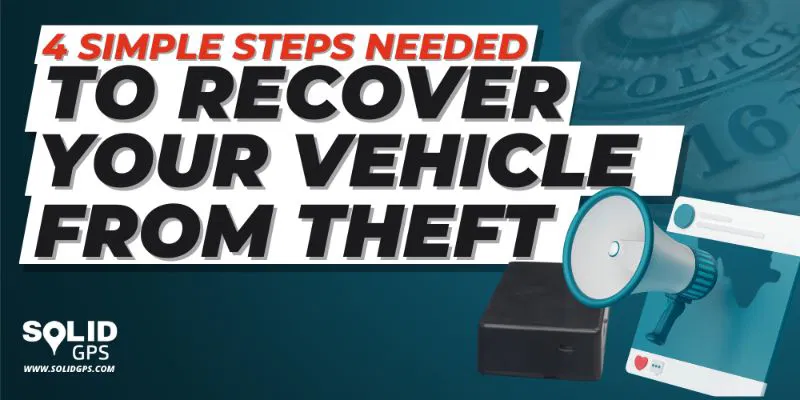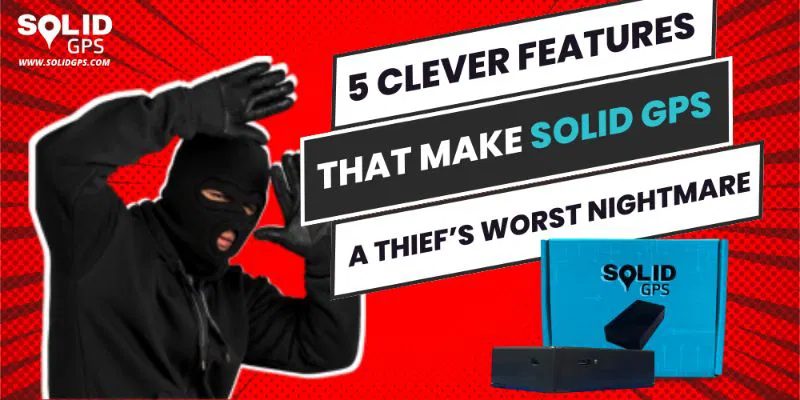Why Do You Need To Understand GPS Trackers?
A basic understanding of how GPS trackers work can help you make an informed decision when purchasing a tracking device, so you don’t get ripped off.
During the early stages of our business, we spoke with a motorcycle shop owner—a street-smart type of guy. He had been working on motorcycles for practically his entire life.
Surprisingly, he didn’t want to use GPS trackers to protect his vintage motorcycles because he didn’t trust the technology. With bikes like a 1962 BMW R69S and a 1974 Harley-Davidson in his collection, this was shocking!
Since we design, develop, and build GPS trackers for a living, this conversation highlighted one important realisation: the tech world uses a lot of jargon, but that doesn’t mean GPS trackers are difficult to understand.
That’s our mistake—and a big one at that. If people don’t understand GPS trackers and how they work, they’re unlikely to invest in one.
In this guide, we’ll break down GPS trackers and how they function, using Solid GPS as an example to help you better understand their benefits.
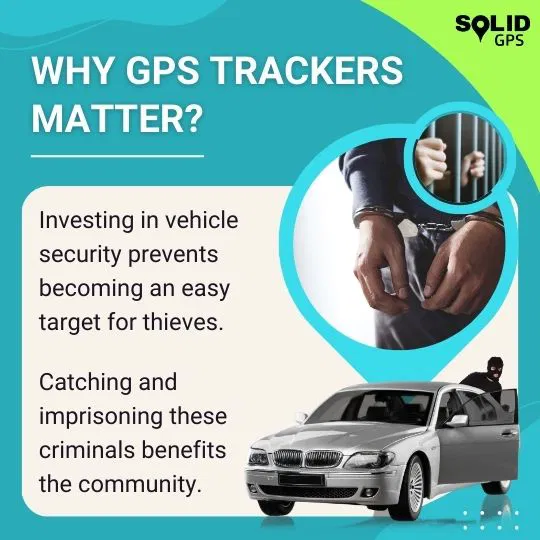
What Is A GPS Tracker?
A GPS tracker is a small device that tracks its location using satellites. This data is transmitted through cellular networks, via the SIM card inside the GPS tracker, to a server.
From there, your phone or computer can display the location of the GPS tracker on a dashboard.
GPS tracking relies on a method called trilateration. It’s the process of calculating the position of a GPS tracker by measuring the time it takes signals from at least four satellites to reach the device. These signals provide precise information about latitude, longitude, and altitude, allowing your GPS to give highly accurate real-time location data.
This technology is fundamental to the functioning of all GPS systems. Without it, the accurate positioning of vehicles, assets, or people would not be possible.
Why Should Anyone Use a GPS Tracker?
Imagine completing a rebuild on your Harley, receiving a classic 1964 Mustang from your father, or finally purchasing that dream Jayco Silverline camper. Would you park it in your driveway, hoping that opportunistic thieves just walk on by? Of course not!
You’d take precautions—locks, alarms, or other deterrents. But what if criminals get past those defences?
That’s where a GPS tracker comes in. Not only can it help you recover your stolen vehicle, but it also provides peace of mind knowing your prized possessions are protected 24/7.
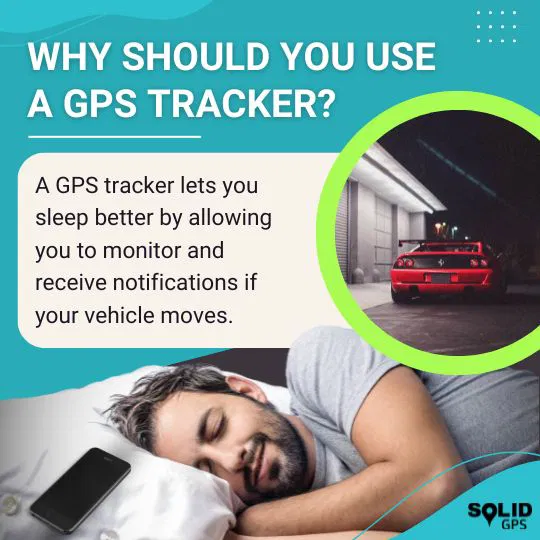
How Often Does A Tracker Transmit Its Location?
The frequency with which a GPS tracker transmits its location can vary. Wireless GPS trackers like Solid GPS send location updates every 2 minutes and slowly increase to 10 minutes.
For infrequent use, Solid GPS still sends its location every 24 hours when stationary, giving you peace of mind even if you don’t drive or ride your vehicle regularly.
Real-Time Monitoring and Historical Data
Not only do GPS trackers provide real-time monitoring, but they also log historical data.
This feature allows you to review past trips and movements, ensuring you have a complete picture of where your vehicle or asset has been.
Historical data is valuable for both personal use and business operations, such as fleet management or verifying vehicle use.
Solid GPS allows you to view this historical data on your mobile app, letting you review routes, detect potential misuse, or confirm deliveries for up to a year in the past.
Fleet Management Optimisation
GPS trackers are a cornerstone of modern fleet management. They help businesses streamline their operations in several ways:
- Route Planning: Optimise delivery or travel routes to save fuel and reduce time on the road.
- Fuel Management: Monitor fuel consumption by ensuring vehicles are taking the most efficient routes.
- Driver Behaviour: Track behaviours such as speeding or harsh braking, improving driver safety and lowering costs associated with accidents.
- Idle Time Reduction: By tracking vehicles in real-time, businesses can minimise idle times, reducing fuel waste and improving efficiency.
Geofencing Capabilities
Geofencing allows you to set virtual boundaries around specific areas.
For example, you can define a geofence around your home, workplace, or any other location. If the vehicle or asset crosses these boundaries, you receive an instant alert.
This feature is especially useful for businesses managing fleets or individuals who want added protection for their vehicles.
With Solid GPS, you can create and customise geofences from your app, ensuring that you’re always informed if something unexpected happens.
Wireless vs. Hardwired GPS Trackers
The key difference between wireless and hardwired GPS trackers is the power source.
Wireless trackers are portable, powered by batteries, and ideal for temporary uses. They are great for motorcycles or trailers, as they can easily be hidden and moved.
Hardwired trackers, on the other hand, are directly connected to the vehicle’s electrical system. These trackers offer continuous tracking without the need for battery recharging but are more permanent and ideal for cars and larger vehicles.
Solid GPS provides wireless trackers that are perfect for individuals who need flexibility and easy installation.
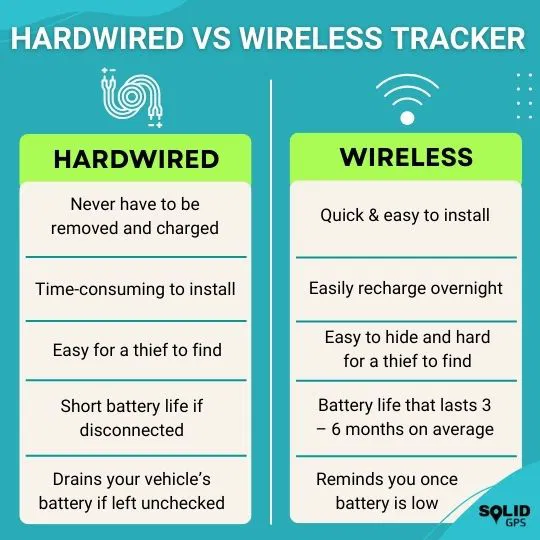
SIM Cards and Connectivity for GPS Data
Most GPS trackers, including Solid GPS, rely on SIM cards to transmit data over cellular networks. Our trackers come pre-installed with a SIM card that automatically connects to the best available network. This ensures consistent tracking, whether you’re in the city or a rural area.
When choosing a SIM card, make sure it supports 4G or higher to ensure future compatibility.
For instance, Australia’s 3G network is shutting down in 2024, which would render any 3G-only tracker obsolete. Solid GPS trackers are ready for the future, supporting 4G and 5G networks to ensure uninterrupted tracking.
Before we move on, if you do buy your own SIM card, make sure you’re able to use it for GPS tracking. Some, such as ALDI SIM cards, have clear limitations on their services that inhibit them from being used for location tracking.
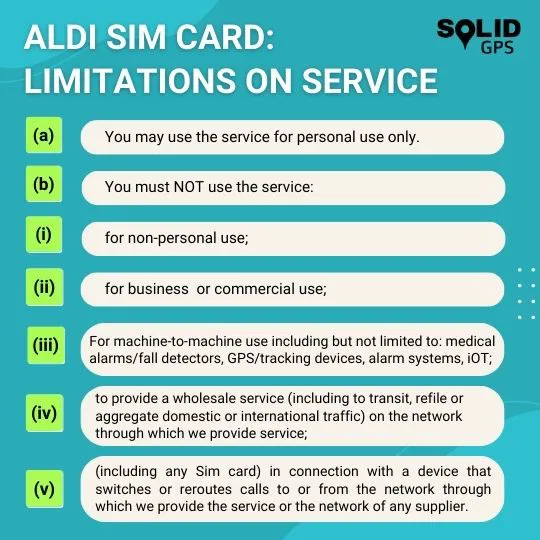
Data Privacy and Legal Considerations
When using GPS trackers, it’s important to comply with legal regulations and data privacy laws.
Consent is key—if you’re tracking a vehicle driven by someone else (such as an employee), it’s essential to inform them about the tracking for legal and ethical reasons.
At Solid GPS, we take data privacy seriously. Your tracking data is encrypted and stored securely, and we comply with all legal regulations related to GPS tracking.
Advanced Features: Two-Way Communication and Panic Buttons
While some GPS trackers offer advanced features such as two-way communication and panic buttons for emergency situations, these are often found in more specialised personal trackers or high-end vehicle trackers.
Solid GPS focuses on providing affordable, reliable tracking for vehicles and assets, leaving out these optional features to keep costs low.
However, it’s good to be aware that these features exist if you need additional safety measures, especially for personal or business use.
What Is the Difference Between $30 and $1,000 Trackers?
At the higher end of the price spectrum, you’ll find wired GPS trackers loaded with telematics and advanced features, ideal for fleet management.
These trackers are connected to the vehicle’s electrical system, providing detailed insights into vehicle performance and location but come at a premium.
On the lower end, you may find Bluetooth-only trackers with short battery life, primarily useful for small-scale tracking, like keeping tabs on pets or small items.
Solid GPS offers a middle-ground solution, providing reliable wireless GPS tracking with excellent battery life, a user-friendly app, and no need for costly telematics.
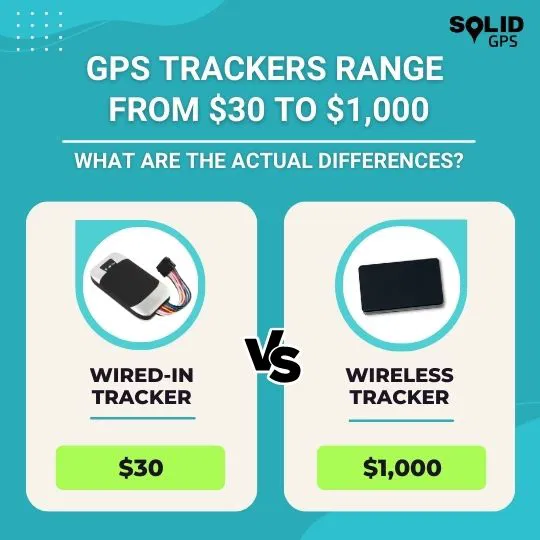
What If My Vehicle Is Stolen?
If your vehicle is stolen, a GPS tracker like Solid GPS can immediately notify you of its location, significantly increasing the chances of recovery.
In addition to using the tracker, we recommend sharing the incident on social media platforms like Facebook.
Thousands of vehicles have been recovered through word of mouth on these platforms.
Learn more about the four simple steps to recover your vehicle from theft.
What Should I Do If I Want To Know More?
If you have additional questions or need clarification about GPS tracking, our FAQ section is a great resource for common inquiries and helpful information.
We’re committed to helping you understand how GPS tracking works and how it can safeguard your vehicle or assets.
If you still have questions after reviewing the FAQ, don’t hesitate to contact us at support@solidgps.com or through the contact form at the bottom of the page.

